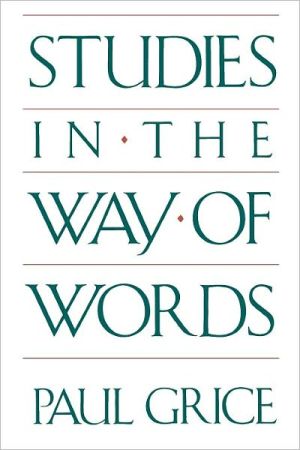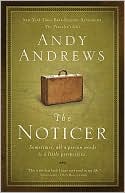Studies in the Way of Words
This volume, Grice's first book, includes the long-delayed publication of his enormously influential 1967 William James Lectures. But there is much, much more in this work. Paul Grice himself has carefully arranged and framed the sequence of essays to emphasize not a certain set of ideas but a habit of mind, a style of philosophizing.\ Grice has, to be sure, provided philosophy with crucial ideas. His account of speaker-meaning is the standard that others use to define their own minor...
Search in google:
This volume, Grice's first hook, includes the long-delayed publication of his enormously influential 1967 William James Lectures. But there is much, much more in this work. Paul Grice himself has carefully arranged and framed the sequence of essays to emphasize not a certain set of ideas but a habit of mind, a style of philosophizing.Grice has, to be sure, provided philosophy with crucial ideas. His account of speaker-meaning is the standard that others use to define their own minor divergences or future elaborations. His discussion of conversational implicatures has given philosophers an important tool for the investigation of all sorts of problems; it has also laid the foundation for a great deal of work by other philosophers and linguists about presupposition. His metaphysical defense of absolute values is starting to be considered the beginning of a new phase in philosophy. This is a vital book for all who are interested in Anglo-American philosophy. Simon Blackburn - Times Literary Supplement Grice was a miniaturist who changed the way other people paint big canvases. The question of correct scale is ultimately one of intellectual judgment, and in this his magisterial, fastidious prose rebukes those of us who want to move faster. [His] work culminated in the William James lectures delivered at Harvard in 1967, and philosophers will he grateful for having them finally available in one volume, Studies in the Way of Words, together with many other of Grice's papers, and a retrospective epilogue, written within two years of his death.
Part I. Logic and Conversation (1967, 1987)1. Prolegomena2. Logic and Conversation3. Further Notes on Logic and Conversation4. Indicative Conditionals5. Utterer's Meaning and Intentions6. Utterer's Meaning, Sentence-Meaning, and Word-Meaning7. Some Models for ImplicaturePart II. Explorations in Semantics and Metaphysics8. Common Sense and Skepticism (c. 1946-1950) 9. G. E. Moore and Philosopher's Paradoxes (c. 1953-1958) 10. Postwar Oxford Philosophy (1958) 11. Conceptual Analysis and the Province of Philosophy (1987) 12. Descartes on Clear and Distinct Perception (1966) 13. In Defense of a Dogma (with P. F. Strawson, 1956) 14. Meaning (1948, 1957) 15. The Causal Theory of Perception (1961) 16. Some Remarks about the Senses (1962) 17. Presupposition and Conversational Implicature (1970, 1977) 18. Meaning Revisited (1976, 1980) 19. Metaphysics, Philosophical Eschatology, and Plato's Republic (1988)Retrospective Epilogue (1987) Index
\ Times Literary SupplementGrice was a miniaturist who changed the way other people paint big canvases. The question of correct scale is ultimately one of intellectual judgment, and in this his magisterial, fastidious prose rebukes those of us who want to move faster. [His] work culminated in the William James lectures delivered at Harvard in 1967, and philosophers will he grateful for having them finally available in one volume, Studies in the Way of Words, together with many other of Grice's papers, and a retrospective epilogue, written within two years of his death.\ — Simon Blackburn\ \ \ \ \ \ Harvard University Hilary PutnamSome philosophers are important because they have produced an important article or an important theory; others are important because, in addition to producing articles and theories, they have minds that "scintillate" in a certain way. Grice is a philosopher of this second and greater type... Grice's intellect, power, and charm are all vehicles for conveying a vision of philosophy, a vision that has much to say to analytic philosophers today.\ \ \ SynthéseIn interest and power this book far exceeds most publications of our time.\ — P. F. Strawson\ \ \ \ \ SyntheseIn interest and power this book far exceeds most publications of our time.\ — P. F. Strawson\ \ \ \ \ \ Times Literary SupplementGrice was a miniaturist who changed the way other people paint big canvases. The question of correct scale is ultimately one of intellectual judgment, and in this his magisterial, fastidious prose rebukes those of us who want to move faster. [His] work culminated in the William James lectures delivered at Harvard in 1967, and philosophers will he grateful for having them finally available in one volume, Studies in the Way of Words, together with many other of Grice's papers, and a retrospective epilogue, written within two years of his death.\ — Simon Blackburn\ \ \ \ \ Library JournalThis book comprises a revised version of the late author's 1967 William James Lectures, published for the first time; reprints of 12 papers, some slightly revised; and a 1987 retrospective commentary on three aspects of the papers. The lectures are a detailed examination of assertion, implication, and meaning; and the papers discuss ordinary language philosophy, meaning, conversational implicature, the philosophy of perception, and metaphysics. In the lectures, Grice emphasizes that language serves many important functions besides scientific inquiry, distinguishes different sorts of meaning, and theorizes about the kinds of implication that our utterances exemplify in ordinary conversation. The papers analyze numerous topics, including different kinds of meaning. Grice's writing is pellucidly clear, his analyses subtle, and his arguments detailed and rigorous. For all major philosophy collections.-- Robert Hoffman, York Coll., CUNY\ \ \ \ \ BooknewsLectures on the nature and philosophical importance of two closely linked ideas characterized as that of assertion and implication and that of meaning. Also includes a methodological or programmatic approach to philosophy through a study of language, in particular of "ordinary" language. No bibliography. Annotation c. Book News, Inc., Portland, OR (booknews.com)\ \








